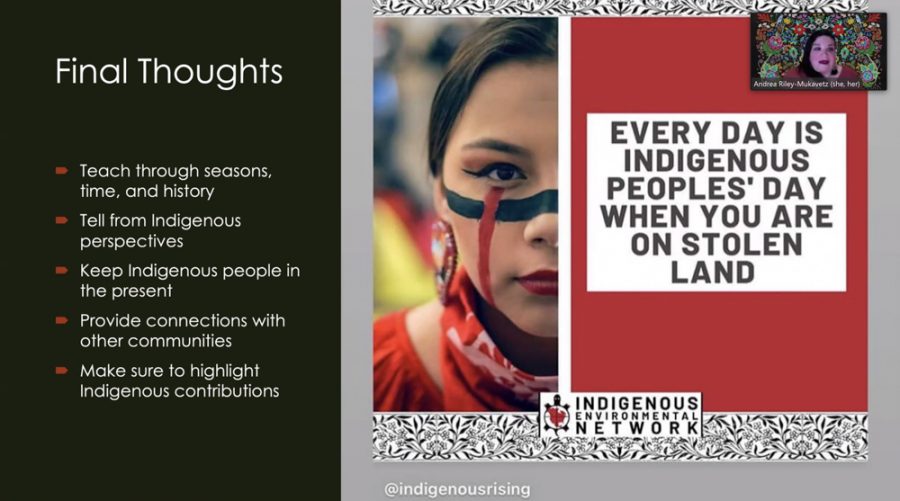Groundswell holds event on Anishinaabe Tribe, environmental sustainability
Mar 22, 2021
“An Indigenous Way of Being,” a Groundswell event held March 16, focused on teaching environmental sustainability and how Native Americans provide a crucial perspective on the issue.
The product of a collaboration between the Integrative, Religious and Intercultural Studies Department and Grand Valley State University’s Native American Heritage Celebration, the virtual event hosted two speakers, Andrea Riley-Mukavetz and Hunter Genia, to talk about Anishinaabe teachings, and how they provide sustainable paths to protecting the environment.
“As we continue to talk about global climate crisis or sustainability, or environmental justice, we have to begin by listening to indigenous peoples and tribal nations,” said Riley-Mukavetz, an assistant professor in the Integrative, Religious, and Intercultural Studies Department at GVSU. “There already are frameworks around how to do this. For us to engage in environmental justice, we have to treat the land as if it is a teacher, a living being, or something that we are in reciprocity with, and not as if it’s something to extract from. Then we can have a different kind of approach to sustainability.”
Riley-Mukavetz used her experiences as a lens into how better environmental policy could be put into practice. The Groundswell event had a strong focus on how Anishinaabe culture and traditions could be integrated into the classroom to support the teaching of environmental education, and Riley-Mukavetz stressed that change started with how students learned about the earth.
“In general, for Anishinaabe people, we approach education in a very holistic and interconnected way,” Riley-Mukavetz said. “All of our traditional cultural practices, whether it’s foraging, hunting, fishing, building teaching lodges, or gardening, all of those practices have important educational components built into them. Educators can learn a lot from these practices when teaching about environmental sustainability.”
Genia took a different focus for his section of the event, to speak about some lesser-known parts of Native American history. He focused primarily on the Indian Boarding School era and the negative impact that these government-funded institutions had on Native American families while they still operated only a few decades ago.
His segment of the event helped serve to better clarify the perspective that Native Americans come from, and help establish why what they have to say is important.
“One of the big problems I see is that a lot of institutions stop teaching history by around the year 1900,” Genia said. “But important Native American history happened after that too. Both my parents and siblings attended Indian boarding schools, so this is very recent history, but even educated adults can have a lack of awareness about Indian Boarding Schools. It’s not that people aren’t willing to promote the truth- it’s that they didn’t know in the first place. We do need systematic change, and to provide training and workshops to teachers and organizations. We have to do a much better job to make sure that important and relevant history is taught in our classrooms.”
The event concluded with a question-and-answer session, with participants engaging in dialogue with the speakers. There were several dozen people in attendance who listened to Genia and Riley-Mukavetz.
“I wanted to create an opportunity to hear stories and voices that we may not have heard before,” said Jessica Vander Ark, Groundswell Project Manager and organizer of the event. “The speakers inspired us to want to learn more, listen more, and tell the stories, even if they don’t all have happy endings. We can’t be afraid of learning our true history if we want to be enlightened moving forward.”























